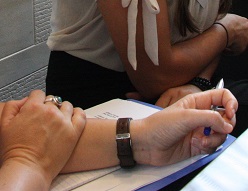Learn to Write for Education
 Course writing produces materials to direct and support a journey of learning; and that's different to other forms of writing, which have very different purposes (e.g. to tell a story, affect an opinion, or document information).
Course writing produces materials to direct and support a journey of learning; and that's different to other forms of writing, which have very different purposes (e.g. to tell a story, affect an opinion, or document information).
Some of the rules that apply to other forms of writing (eg. not repeating information), may not apply to writing for education (eg. repetition is important to the learning process).
This course helps you develop skills to not only develop course curricula and lesson plans; but also study guides, student handouts ands other written materials used in education.
Course Structure
There are 9 lessons in this module as follows:
1. Bases for Education
- Introduction to Writing for Education
- Establishing Course Aims
2. Course Writing Methodologies
- Developing Courses
- Course Outlines
- Curriculum Documentation
- Study Notes
- Continuous or Periodic Course Review and Development
- Identifying Needs; student perspective, educators perspective, family perspective, community and industry perspective
- Identifying Resources; student and teacher
- Writing Aims, Competencies and Assessment Criteria
- Writing Course Notes
- Writing Practicals
- Writing for Clarity and Understanding; principles of good writing, structuring the course
- Coding Courses
- Flexible Delivery
- Applying Strategies for Flexible Delivery
- Course Components; Assignments, Exercises, Brainstorming, Buzz Groups, Demonstration, Discussion, Case Study, Guest Speakers, Laboratory Work, Lecture, Mutual Lectures, Practical Workshop, Project, Tutorials
3. Level of Study
- Determining Appropriate Level of Study; Quantitative and Qualitative Factors
- Descriptors
- Duration
- Assessment
- Levels of Training; e.g. varying certificate levels between UK and Australia
- Lessons and lesson plans
- Determining level required
- Identifying student needs
- Allowing for different modes of study
- Structuring a lesson
- Timing a lesson
- Evaluating and improving a lesson
- Levels and kinds of Language
- Language of learning, and Professional language
- Determining level of Training
- Skills and Training Objectives; Competence
4. Curriculum Documentation
- Scope and Nature
- Examples
- Structure and Layout
5. Course Materials
- Introduction
- Teaching Resources
- Learning Resources
- PBL Project: Develop a new course with minimum use of limited resources, financial and other.
6. Course Material Creation
- Developing knowledge
- Applying Knowledge
- Reflection and Review
- Developing Skills
- Innovation and Flexibility
- Types of Support Materials; documentation, visual elements and illustration, technical aids
- Factors to Consider when Writing Support Materials
- Writing for Distance Education; Problems and Solutions
- Writing a Question
- Dealing with Practical Aspects of Education
- Clarity and Consciousness
- Improving Clarity
- Understanding Causes of Confusion
- Ways to Write Concisely
- Differentiating between Guidelines, Instructions and Procedures
- Correspondence Course Structure
- Writing PBL Documentation
- Handouts
- Visual Materials; Illustration, Charts
- Audio Materials, Recorded Presentations
- Digital Technology; Educational Applications for Digital Technologies
- Multimedia
- The Internet
7. Reviewing and Updating Courses
- Change and Inertia in Education
- Policies and Procedures to Support Change
- How to Review a Course
- Procedure for Changing an Established Course
- Procedure for Maintaining Currency
8. Recognition and Accreditation
- Who can Provide Education
- Universal Recognition; Is it Possible
- Scope of Endorsement Systems
- Recognition and Qualifications
- What is Accreditation
- The Value of Accreditation
- Accreditation Myths
- Recognition and Accreditation Systems
- Trends
- Who accredits or recognises what
- Secondary, Vocational, University Education
- Industry Training Boards
- Accreditation Authorities
- Other Forms of Recognition
9. Application and Implementation
- Delivering Classroom Based Courses
- Session Organisation
- Delivering Practical Courses Outside a Classroom
- Delivering Distance Education Courses
- Customising Distance Education
- Assessment and Evaluation
- Purpose of Assessment
- Formulative, Cumulative and Summative Assessment
- Assessment Policies and Procedures
- Marking Guidelines for Assignments
Course Duration: 100 hours
Aims
- Determine an appropriate basis for developing a course to suit a given need.
- Write course documentation and materials methodically and with clarity.
- Explain differences between levels of study, particularly in post secondary education.
- Write curriculum documentation for a course.
- Identify and evaluate sources for course materials and support services for a course.
- To plan and create a variety of course materials to support learning.
- Establish procedures for reviewing and updating established course materials.
- Compare relative values of formal course endorsement systems.
- Plan the implementation of a developed course.
HOW TO CREATE LESSONS AND LESSON PLANS
Determining the level required
The level required may sometimes be predetermined by the accreditation and recognition system for which a course is developed. Different recognition systems will clearly dictate just what a course should or should not achieve.
In other situations, the market place may be the overriding force that determines what level is required. If you are developing a course for a particular client, or are aiming at selling it to a particular clientele, you need to determine the level they will require or respond to, then tailor the course to that level.
In some instances, a course may need to cater to students who are entering at different levels of competence, and seeking to learn at different levels. It is possible to develop a “multi level” course, but this is more complex, and does require more skill to build appropriate flexibility into the course design.
Identifying student needs
 Course content should be structured on generic skills and knowledge. Once you have developed the learning outcomes associated with each course, and for each lesson within the course, use these as guidelines to write course content.
Course content should be structured on generic skills and knowledge. Once you have developed the learning outcomes associated with each course, and for each lesson within the course, use these as guidelines to write course content.
Individual student needs in a multi-level course can be addressed by structuring the set tasks and assignments etc. in such a way as to cater for students with generic skills from basic to advanced levels. Students with a lower set of generic skills for example should find the course requirements challenging but not daunting. Students with more developed skills should have the opportunity to further develop their knowledge. One set of tasks and assignments for each lesson can address the needs of all students if they are written in such a way as to encourage each student to build on their knowledge irrelevant of their skills level. For example: Through research explore the various types of home irrigation systems available.
This allows the student to set limits that are appropriate and within their capabilities but still cover the course requirements. Obviously the teacher needs to closely guide and monitor each student to ensure that they are meeting the learning outcomes.
Allowing for different modes of learning
Students learn in different ways and educators must have the ability to identify which approach is best for the students and the courses that they are teaching. In times past teachers took full responsibility for the student’s learning processes. They would structure the content and deliver it in such a way as to also give meaning to it through their own interpretation. They would also set and direct the learning objectives through a structured approach.
This approach developed into a more co-operative system where students and teachers worked together. The teacher would guide the students and elicit responses and content would be mutually decided. Recent developments favour a more autonomous learning approach. Teachers encourage, direct and facilitate learning and students are much more self-determined in their learning.
Structuring the lesson
This may be something like the following:
- Lesson aim and objectives – students need to know what they will be able to do after they have finished the lesson.
- Lesson content – could be through set reading, explanation, explanation, lecture or a combination.
- Demonstration i.e. back up your content.
- Student participation i.e. questions interaction.
- Practice- i.e. set tasks, research etc.
- Self – determined learning – assignments, PBL projects.
Timing the lesson
Lessons build knowledge. A course should be structured in such away that each lesson builds on or adds to the knowledge of the previous one. They should be sequential. For example it would be confusing for a student in horticulture for example to be asked to conduct soil testing experiments in lesson 2 when the lesson on soils is not until lesson 4. Another example a lesson on irrigation practise would also be best scheduled after the soils lesson, so students understand the abilities of various soils to absorb, retain and drain water.
Evaluating and improving a lesson
Match the lesson content with how well it was implemented and what your students learned. The student’s understanding of a lesson should become apparent through the way in which they approach their self-directed tasks. Lessons can be further improved by analysing and documenting each student’s achievements. Lessons should be altered if you find that generally speaking students are not responding or achieving the lesson aims and objectives.

WHEN CAN I START?
ACS courses are available to start at any time.
You can Register to Study today - Go to the panel towards the top of this page (right column),
or
- If you have any questions, get in touch with our highly knowledgeable specialist tutors. They will be happy to answer any questions and discuss study options with you.